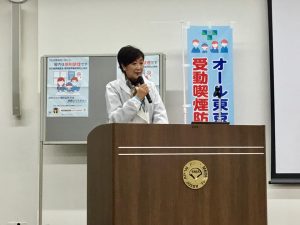Tokyo Governor Yuriko Koike urged residents to stay indoors over the weekend to help fight the spread of coronavirus after domestic cases of COVD-19 more than doubled, raising the alarm over the hidden growth of infections in urban areas.
On Wednesday, the daily infection rate surged from 17 to 47 cases, with 10 people unable to trace the route of infection. In an emergency press conference, Koike warned of an explosion of mass infections and urged everyone to cooperate by scrapping nonessential outings, especially over the weekend as the city reaches a critical phase to contain an outbreak. Although the appeal is a “soft” shelter in place order, Koike warned that a mandatory lockdown in urban Tokyo, with a population of 13 million people, could be enforced if a state of emergency is declared.
Chief Cabinet Secretary Yoshihide Suga reiterated that declaration would only be used as a last resort, which does not apply to the current situation. But that didn’t deter another panic buying frenzy in Tokyo, with fresh food and vegetables flying off shelves. The buying spree followed the first spate in late February, which created storefront shortages of face masks, toilet paper, and hand sanitizers.
Amid the rapidly evolving public health crisis Japanese residents are facing serious mixed messages. Last week the government announced that the month-long school closure won’t be extended and enlisted local municipalities to decide whether or not to reopen schools in areas where no new coronavirus cases have been detected. This was followed up with new infection control guidelines for schools to help usher in a new academic year starting in April amid the global COVID-19 pandemic.
The newly formulated guidelines aim to help schools prevent learning disruptions and reduce the risk of infection by tackling three conditions that can lead to an outbreak: namely classroom ventilation, face-to-face conversations, and close contact between students and teachers. Schools have the difficult task of monitoring daily temperature checks, the wearing of masks, and social distancing between students at all times.
Education Minister Koichi Hagiuda stressed that Japan was not in the clear and everyone should exercise caution by avoiding large gatherings. He said schools could also be asked to shut down again if there is an explosion of cases, saying, “The situation has not improved. We want schools to prepare for reopening without lowering their guard.”
The number of infections in Japan to date stands at 1,373 nationwide, excluding cases from the Diamond Princess cruise ship.
The Ministry of Education’s announcement has offered only a brief moment of relief for parents of school-aged children, who welcomed a return to normalcy in a time of global uncertainty. In late February, Prime Minister Shinzo Abe followed the lead of foreign countries in ordering nationwide school closures, but the move was made without consultation with infectious disease experts and was criticized for being “abrupt.” In local media reports, parents highlighted the financial stress and fatigue placed on households having to adjust work schedules to provide home childcare and balance educating and entertaining children without school.
Five days ago, a panel of experts advising the government praised the cancellations of large public events as an effective precaution in fending off widespread infection. But the government go-ahead for school openings may have come too soon, with metropolitan Tokyo signaling a rapid rate of infection is on the horizon.
The custom of gathering under the cherry blossoms in full bloom, known as hanami, is a famous spring ritual at the center of the nation’s social calendar. Earlier this month the Tokyo Metropolitan Government released a statement urging the public to refrain from holding hanami parties in parks in addition to previous requests to stop all gatherings that involve eating and drinking in parks and riverbeds. Despite popular hanami festivals in Tokyo having been called off in an effort to minimize the spread of infection, photos on social media emerged of groups ignoring social distancing in favor of picnicking under sakura trees.
Currently the Ministry of Health recommends people exhibiting minor symptoms to self-isolate at home, limiting the option of PCR testing to suspected cases meeting a strict criteria of direct exposure. Japan’s scattered coronavirus testing has sparked public frustration. On Tuesday National Health Insurance announced the possibility of online medical assessments where drugs can be prescribed for mild symptoms.
*Corrections made to Japanese names.

































